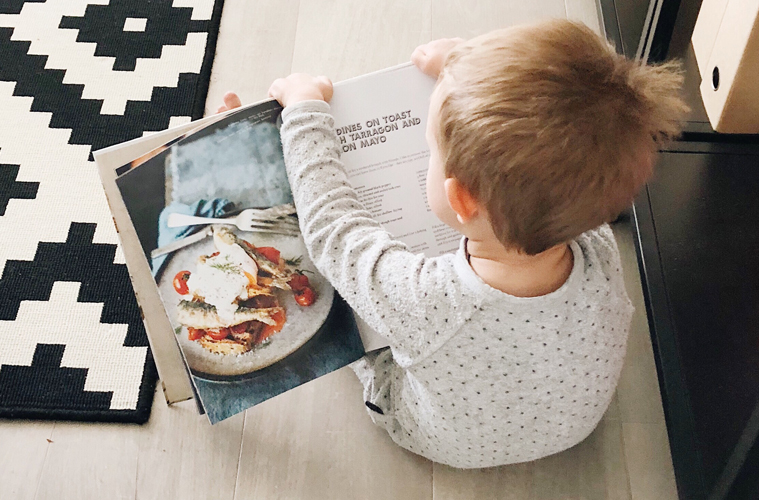The other day I was having an afternoon snack with my almost three year old son. Freshly baked muffins had just come out of the oven and I was looking forward to a cup of tea and some sweet baked goods. Yum, right?
Finn got his muffin, happily started gnawing on it and after a few bites he asked if he could go get himself an apple. To be honest I was a little torn between being offended and being proud :). He got his apple, ate a bit of that, ate a bit more of the muffin and then left it half finished to tell me he had enough and wanted to go play.
Now, if you know me, you know this was a ‘proper’ muffin, not a ‘replace all the supposedly bad stuff with supposedly good stuff’ kinda muffin. So why wasn’t he gorging himself on the sweet stuff on offer?
How did we get here?
Let me assure you that I’m most certainly not mother of the year. This isn’t to say that I’ve got this all down pat. I struggle with plenty of things and often get heaps of stuff wrong. All the time. Just the food situation seems to work out quite well at this point (#knockonwood).
Of course he likes sweets, loves ice cream and if other kids have glow in the dark red lollies full of artificial stuff, he will want that too. But to my amazement he’ll also leave it when he’s done and I have seen him at a birthday party put down the cake pops to grab a fruit stick instead.
Access to sweets in our house
You see, I never restricted Finn’s access to sweets. I also don’t label food as ‘good food’ or ‘bad food’ or anything along those lines. Not because I have thoroughly thought this through and made it a thing, but because that is what I truly feel for myself as well. We don’t have any rules around when sweets are allowed either, as in ‘only on weekends’ or ‘only after you finish your meal’.
I believe in variety (and yes, lots of wholefoods, vegetables, homecooked meals, bla bla bla) but sweets are a part of this variety for me. The homemade and occasionally the processed.
Don’t get me wrong, I often questioned my approach to sweets and raising my child. We’re never quite sure we are doing the right thing as new parents, are we. Doubt is around every corner when it comes to parenthood. Especially as I often saw other parents restricting what their child is allowed to eat. Or worrying about what will happen when the littlies leave their grasp and are confronted with the real world, where fast food and sweet stuff is ever present. But the thing is, you can’t stop that. It will happen sooner or later.
What we really need to ask ourselves is how we can teach our kids to choose a balanced diet and listen to their bodies.
What the experts say
I am not a nutritionist or dietitian and having one child and another one on the way doesn’t make me an expert on this subject. That’s why I encourage you to listen to Laura Thomas’ podcast episode on How to raise an intuitive eater. Laura is a registered nutritionist and works in London with the focus on intuitive eating. In this episode she interviews Catherine Lippe who is a nutritionist specialising in paediatric and maternal nutrition.
It is a fantastic episode and spoke to me on a number of levels.
Firstly I felt encouraged to continue with my approach to food in general, for myself, as well as my family.
Secondly, it invites you to relax about food, and who doesn’t want that!
And thirdly, it helps you to keep the bigger picture in mind. It focuses on the kind of eater you want to raise, not which food your child may or may not be having right this second.
Some key points that I found very reassuring
- Instead of trying to make your child a perfect eater, it’s more important to think about the long term effects of the food relationships they are building.
- Treating sweets as everyday foods is a better approach than putting them on a pedestal.
- There are no good or bad foods. Labelling them in that way can create a feeling of shame. And nothing positive can come from feeling shameful and guilty about something.
- Restricting foods has the opposite effect: It makes them more desirable.
- Instead it is important to create a level playing field of all foods to avoid a hierarchy where one food is better than the other.
- Children have the ability to regulate their feeding and it is important to encourage them to listen to their hunger cues, instead of overwriting them. It’s important to develop the child’s autonomy around food and eating because that helps reinforce that they can trust their bodies.
- It’s not unusual for kids to prefer sweet foods, but you can create boundaries and encourage variety without labelling them as good or bad. It applies to all foods that if you eat too much of it you don’t feel good.
- Achieving balance over time is more important than having a balanced meal at every meal time.
If you want to learn more, and also get some great tips for fussy eating if that is a concern for you, have a listen to the podcast episode here.
Really?
Truly. Obviously all of this is easier said than done. I get it. We want what is best for our children. Sometimes it’s hard to let go of control in favour of trust. My own journey towards intuitive eating, before I even knew that there’s a name for it, certainly helped to have this approach with my child. And now, from a non-expert point of view, I’m here to tell you that it does work. In fact it makes life so much less stressful! Most importantly, I have made peace with food myself and it has changed my life. But that is a story for another day.
How this works for us
Generally we have a lot of home cooked meals from scratch. There just isn’t much processed food in the house. That’s not to say that we don’t ever eat any. It’s just not something that is part of our regular diet. This creates a feeling of confidence that we offer balance. It makes me trust that Finn is exposed to enough wholesome goodness and seasonal fruit and veg. When we do have take-away or processed food of any kind, we enjoy it because it ‘hit’s the spot’. I have utter faith in the ‘bigger picture’.
When we are out, we allow Finn to eat and drink whatever the other kids are having. The egg allergy aside anyway. There’s been many things that I wouldn’t choose to give him, but I trust that he needs to learn to navigate those.
We have started to let him serve himself and therefore letting him control his food portions. Sometimes he eats a lot (cue those Kale Spaghetti), sometimes only a little. I’m ok with that. Many things play a role in how hungry we are and how much food we need each day. That is true for us adults as well as our kids.
Now over to you! How do you manage sweets around your kids? Do you think all of this is totally bonkers and 100s and 1000s should be barred from this earth forever? Or do you feel there might be some truth (and relief) in this approach?
Much love,
Katrine x

